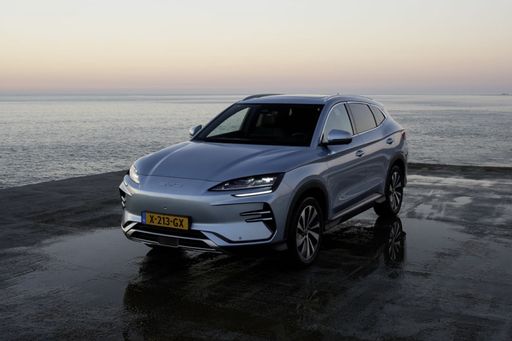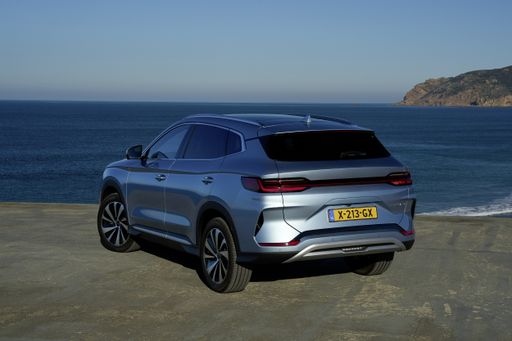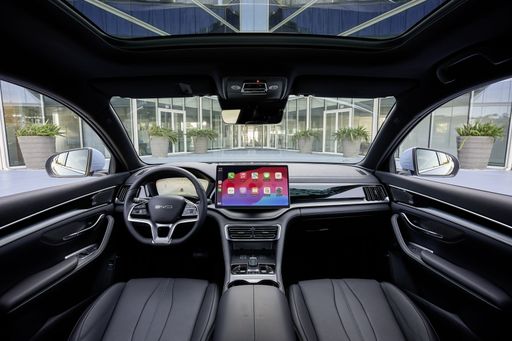BYD Seal U VS Hyundai Bayon – Specs, Efficiency & Price Comparison
Which model is the better choice – the BYD Seal U or the Hyundai Bayon? We compare performance (324 HP vs 100 HP), boot capacity (552 L vs 411 L), efficiency (19.90 kWh0.90 L vs 5.40 L), and of course, the price (33300 £ vs 20100 £).
Find out now which car fits your needs better!
The BYD Seal U (SUV) is powered by a Plugin Hybrid or Electric engine and comes with a Automatic transmission. In comparison, the Hyundai Bayon (SUV) features a Petrol engine and a Manuel or Automatic gearbox.
When it comes to boot capacity, the BYD Seal U offers 552 L, while the Hyundai Bayon provides 411 L – depending on what matters most to you. If you’re looking for more power, you’ll need to decide whether the 324 HP of the BYD Seal U or the 100 HP of the Hyundai Bayon suits your needs better.
There are also differences in efficiency: 19.90 kWh0.90 L vs 5.40 L. In terms of price, the BYD Seal U starts at 33300 £, while the Hyundai Bayon is available from 20100 £.
Compare all the key specs now and find out which model fits your lifestyle best!
BYD Seal U
The BYD Seal U presents itself as a sophisticated addition to the electric vehicle market, blending sleek design with cutting-edge technology. Its modern aesthetic is complemented by a spacious interior, offering both comfort and functionality for drivers and passengers alike. With advanced features prioritising sustainability and performance, it represents a bold step forward in eco-friendly motoring.
details @ press.bydauto.be
@ press.bydauto.be
 @ press.bydauto.be
@ press.bydauto.be
 @ press.bydauto.be
@ press.bydauto.be
Hyundai Bayon
The Hyundai Bayon is a compact crossover that effortlessly merges practicality with modern design. Its sleek exterior and spacious interior make it an ideal choice for urban settings and longer journeys alike. With a focus on comfort and connectivity, this vehicle provides a smooth driving experience paired with advanced technology features.
details @ hyundai.news
@ hyundai.news
 @ hyundai.news
@ hyundai.news
 @ hyundai.news
@ hyundai.news
 @ hyundai.news
@ hyundai.news
 @ hyundai.news
@ hyundai.news

|

|
|
|
|
Costs and Consumption |
|
|---|---|
|
Price
33300 - 39800 £
|
Price
20100 - 25800 £
|
|
Consumption L/100km
0.9 - 1.2 L
|
Consumption L/100km
5.4 - 5.5 L
|
|
Consumption kWh/100km
19.9 - 20.5 kWh
|
Consumption kWh/100km
-
|
|
Electric Range
70 - 500 km
|
Electric Range
-
|
|
Battery Capacity
-
|
Battery Capacity
-
|
|
co2
0 - 26 g/km
|
co2
124 g/km
|
|
Fuel tank capacity
60 L
|
Fuel tank capacity
40 L
|
Dimensions and Body |
|
|---|---|
|
Body Type
SUV
|
Body Type
SUV
|
|
Seats
5
|
Seats
5
|
|
Doors
5
|
Doors
5
|
|
Curb weight
1940 - 2147 kg
|
Curb weight
1170 - 1195 kg
|
|
Trunk capacity
425 - 552 L
|
Trunk capacity
411 L
|
|
Length
4775 - 4785 mm
|
Length
4180 mm
|
|
Width
1890 mm
|
Width
1775 mm
|
|
Height
1668 - 1670 mm
|
Height
1500 mm
|
|
Payload
410 kg
|
Payload
460 - 465 kg
|
Engine and Performance |
|
|---|---|
|
Engine Type
Plugin Hybrid, Electric
|
Engine Type
Petrol
|
|
Transmission
Automatic
|
Transmission
Manuel, Automatic
|
|
Transmission Detail
-
|
Transmission Detail
Schaltgetriebe, Automat. Schaltgetriebe (Doppelkupplung)
|
|
Drive Type
Front-Wheel Drive, All-Wheel Drive
|
Drive Type
Front-Wheel Drive
|
|
Power HP
218 - 324 HP
|
Power HP
100 HP
|
|
Acceleration 0-100km/h
5.9 - 9.6 s
|
Acceleration 0-100km/h
11.3 - 12.4 s
|
|
Max Speed
170 - 180 km/h
|
Max Speed
176 - 179 km/h
|
|
Torque
300 - 550 Nm
|
Torque
172 - 200 Nm
|
|
Number of Cylinders
4
|
Number of Cylinders
3
|
|
Power kW
160 - 238 kW
|
Power kW
74 kW
|
|
Engine capacity
1497 - 1498 cm3
|
Engine capacity
998 cm3
|
General |
|
|---|---|
|
Model Year
2024
|
Model Year
2024
|
|
CO2 Efficiency Class
B, A
|
CO2 Efficiency Class
D
|
|
Brand
BYD
|
Brand
Hyundai
|
BYD Seal U
An Introduction to the BYD Seal U
The BYD Seal U is a groundbreaking entrant in the automotive market, serving as a testament to the brand's commitment to innovative sustainable mobility solutions. Designed as an eco-friendly SUV, the Seal U is available in both Plug-In Hybrid and fully Electric variants, providing consumers with choices that align with their driving habits and environmental concerns.
Innovative Powertrains and Performance
At the heart of the BYD Seal U lies its forward-thinking powertrains. The Plug-In Hybrid model combines a finely tuned 1497 - 1498 cm³, 4-cylinder engine with an electric motor to deliver a total power output of up to 324 PS. The hybrid system is capable of achieving a frugal 0.9 - 1.2 litres per 100 km fuel consumption, though it does not compromise on performance with an impressive acceleration from 0 to 100 km/h in 5.9 - 9.6 seconds.
In the fully Electric variant, the Seal U boasts a substantial performance with up to 238 kW of power, ensuring a brisk ride while providing a clean and silent driving experience. With two battery options offering ranges from 420 km to an expansive 500 km, this electric SUV proves to be a formidable contender for those who prioritise long-distance electric mobility.
State-of-the-Art Design and Comfort
The Seal U's design embodies a sophisticated blend of style and function. Its commanding SUV silhouette, measuring between 4775 - 4785 mm in length, conveys both elegance and robustness. Inside, the vehicle offers room for five passengers, ensuring comfort with plush seating and a spacious interior that's accentuated by advanced ergonomic design and quality materials.
The boot space ranges from 425 to 552 litres, accommodating the demands of family trips or sizable grocery hauls with ease. In terms of technology, the Seal U does not disappoint, featuring an intuitive infotainment system that connects seamlessly with mobile devices, ensuring entertainment and connectivity on the go.
Advanced Safety Features
Safety is paramount for BYD, and the Seal U incorporates a suite of advanced safety technologies to protect its passengers. Systems such as adaptive cruise control, lane-keeping assist, and automatic emergency braking work in concert to enhance the driving experience while providing peace of mind. These features are complemented by a robust body structure designed to absorb and dissipate impact energy efficiently.
Environmentally Conscious Engineering
The BYD Seal U sets a new standard in eco-friendly automotive design. Its Plug-In Hybrid and Electric models both earn impressive CO2 efficiency ratings, ranging from class A to B, thanks to technologies that significantly reduce emissions. Additionally, its Plug-In Hybrid system enables an all-electric range up to 80 km, allowing for short day-to-day trips purely on electric power and making it an ideal choice for environmentally conscious drivers.
Pricing and Model Year
The BYD Seal U is accessible to a wide range of budgets with prices beginning at €38,900 and extending to €44,990, depending on specifications and chosen trim levels such as Boost CVT, Comfort, Design, and Design AWD CVT. As we look to the future, the 2024 model year is poised to continue BYD's tradition of excellence, bringing advanced engineering and sustainable practices to drivers eager for innovation and efficiency.
Hyundai Bayon
Introducing the Hyundai Bayon: A New Era in Compact SUVs
The Hyundai Bayon, a compact SUV designed with urban adventurers in mind, is making waves with its exceptional blend of style, performance, and technology. The brand has pulled out all the stops to ensure that the Bayon stands out in the crowded SUV market, offering a vehicle that is both practical and innovative.
Sleek Design and Cutting-Edge Aerodynamics
The Bayon features a striking exterior design, characterised by its bold lines and angular shapes. With a length of 4180 mm, a width of 1775 mm, and a height of 1500 mm, the Bayon commands attention with its modern appeal and aerodynamic efficiency. These dimensions not only contribute to its sleek design but also enhance fuel efficiency, achieving an impressive 5.4 L/100 km.
Engine Performance and Specifications
Under the bonnet, the Bayon is powered by a 1.0-litre T-GDI petrol engine, delivering a robust 100 PS or 74 kW. This engine is available with either a manual or automatic gearbox, meeting varied driver preferences. The front-wheel-drive system complements its urban-centric design, ensuring a smooth and responsive ride.
Maximised Interior Space and Comfort
The spacious interior of the Bayon accommodates up to five passengers comfortably. The vehicle boasts a boot space of 411 litres, perfect for both everyday use and weekend getaways. The cabin is designed with practicality and technology in mind, with intuitive controls and ample storage options.
Advanced Technology and Connectivity
Hyundai has equipped the Bayon with state-of-the-art technology to enhance the driving experience. The SUV features a high-resolution touchscreen, offering seamless connectivity with Apple CarPlay and Android Auto. Safety is also a priority, with multiple driver assistance systems including lane-keeping assist and forward collision avoidance assist.
Environmental Efficiency
Despite its powerful performance, the Bayon achieves a respectable CO2 efficiency class of D, with emissions as low as 122 g/km. This balance between performance and environmental responsibility makes the Bayon an attractive option for conscientious drivers.
Affordability and Market Appeal
The Hyundai Bayon is competitively priced, ranging from €22,900 to €29,600. Its affordable running costs, estimated at 32.3 to 36.4 cents per kilometre, further enhance its appeal to budget-conscious consumers. With monthly costs ranging from €806 to €909, the Bayon provides excellent value without compromising on features or performance.
Final Thoughts
The Hyundai Bayon truly stands out in the compact SUV segment, combining style, innovation, and practicality in an appealing package. It offers a versatile driving experience suited to the demands of modern urban living, making it a top contender in its class. As Hyundai continues to champion forward-thinking design and technology, the Bayon is a testament to the company's ongoing commitment to excellence.
The prices and data displayed are estimates based on German list prices and may vary by country. This information is not legally binding.
